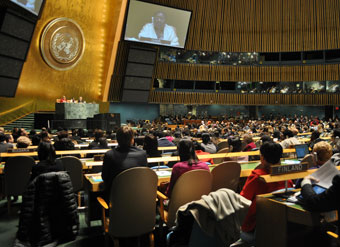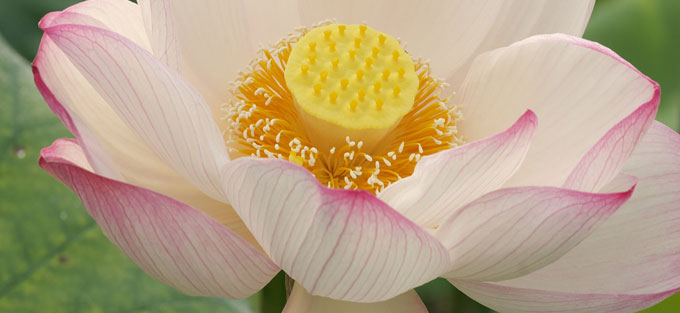by K. M. Deaver
Now as the king of Israel was walking on the city wall, a woman cried out to him, “Help, my lord king!” He said, “No! Let the Lord help you. How can I help you? From the threshing floor or from the wine press?” But then the king asked her, “What is your complaint?” She answered, “This woman said to me, ‘Give up your son; we will eat him today, and we will eat my son tomorrow.’ So we cooked my son and ate him. The next day I said to her, ‘Give up your son and we will eat him.’ But she has hidden her son.” When the king heard the words of the woman he tore his clothes–now since he was walking on the city wall, the people could see that he had sackcloth on his body underneath.” (2 Kings 6: 26-30)
 A few years ago, I attended the United Nations Commission on the Status of Women as a young adult representative. The organization that sponsored our delegation was Church Women United, an ecumenical women’s organization. As a representative of that organization, we were invited to plan and execute one of the morning worship services. The above passage was the reading assigned to that service. As you might imagine we read through the text numerous times before any of us were able to voice our thoughts, or venture an idea as to how we might make such a passage good news for the worshippers.
A few years ago, I attended the United Nations Commission on the Status of Women as a young adult representative. The organization that sponsored our delegation was Church Women United, an ecumenical women’s organization. As a representative of that organization, we were invited to plan and execute one of the morning worship services. The above passage was the reading assigned to that service. As you might imagine we read through the text numerous times before any of us were able to voice our thoughts, or venture an idea as to how we might make such a passage good news for the worshippers.
As individuals began to offer their thoughts on the passage it soon became clear that many wanted to assign blame for the events to someone. Most often this blame fell on the woman who had eaten her son, whereas the woman who had hidden her son was often held up as the “good” one, the positive example in the story.
Many of us expressed the view that such an event would never take place in our world today. The belief, or perhaps the hope, that a mother would never be desperate enough to eat her own child covered the room with an uncomfortable silence.
Next to me, I could feel one of my new friends becoming increasingly tense as she listened to the conversation develop. As the silence stretched, she began to speak. Born and raised in Africa, she recounted the story of the difficult decision her own grandmother had been faced with when raising her children. Putting one child to death in order to feed the others, she reminded us, was and is a daily choice presented to mothers and families around the world.
Following this moving story our conversations began to move in a new way. We began to question why we had been so quick to be angry with and pass judgment on the women in the story rather than directing our emotions at the larger situation which had forced these women into this situation in the first place. We wondered if perhaps the two women might mirror the realities of mothers who experience difficult economic situations. What does it mean that wealthy women horde, or hide, resources in the name of our children at the expense of other children, women and families around the world? Still we questioned–where is the good news in this story?
By the end of our short planning session we had, unfortunately, not come up with a good answer to that question. Instead we designed worship in such a way that all in attendance might also wrestle with us amidst the tension and questions of this text. But my colleagues and I continued to ponder and discuss these questions as our time in New York City continued. Finally, we came upon a quote that helped us gain understanding. Saint Augustine once wrote that “Hope has two beautiful daughters their names are Anger and Courage. Anger at the way things are, and Courage to see that they do not remain as they are.” For those of us participating in the delegation such words brought a level of peace to our questioning.
In our world, just as in our Christian faith, light does shine in the darkness, and beauty and love can be borne from immense sorrow and grief.
The symbol of the lotus flower
Having a history rooted in both Buddhism and Christianity, the lotus flower provides a beautiful example of this cycle of rebirth. At night the lotus flower closes and sleeps, but with the rising of the sun the flower opens and emerges as living. In this same way we remember that Christ died for us and was raised again, and it is within these cycles that we measure and continue our lives as small pieces of creation.
1 Corinthians 13 reminds us that without love we have nothing. Love is given to us as a gift, a gift that is intended to keep on giving! Love, “bears all things, believes all things, hopes all things, endures all things” (1 Cor. 13:7). Though all other things may come to an end love will continue, it is through our confidence in this promise that we are sent out to spread love, hope and faith throughout all of creation. It is this gift of love that inspires us to hope, and it is through this hope that we can be inspired to responsible action. This responsible action allows us to make significant differences in our world. It is through this love and hope that all of creation can be connected in life-giving ways that empower all. Let us always remember that “faith, hope, and love abide, these three; and the greatest of these is love”(1 Cor. 13:13).
Discussion questions
1. Where have you seen the promised light shine in the dark moments of your life?
2. How do you reconcile difficult biblical texts like this one within your faith life?
3. How do you live out God’s message of love in your own life?
Closing prayer
Caring God, we thank you for your presence and love in our lives. Teach us to model your love and care in ways that enrich all of creation. Help us to acknowledge the difficulties that are present in our world and inspire in us the courage to work toward an end to these difficulties. In your name we pray. Amen.
K. M. Deaver is currently pursuing a Ph.D. in Feminist Theology and Ethics at the Lutheran School of Theology at Chicago. Her areas of interest include sexual ethics, and helping to end the oppression and exploitation of women and girls around the world.


Beautifully thoughtful piece — thank you. I am preparing to attend the UNCSW in a few days as a member of the ELCA delegation.
Wonderfully written article and thought provoking for Christian women.